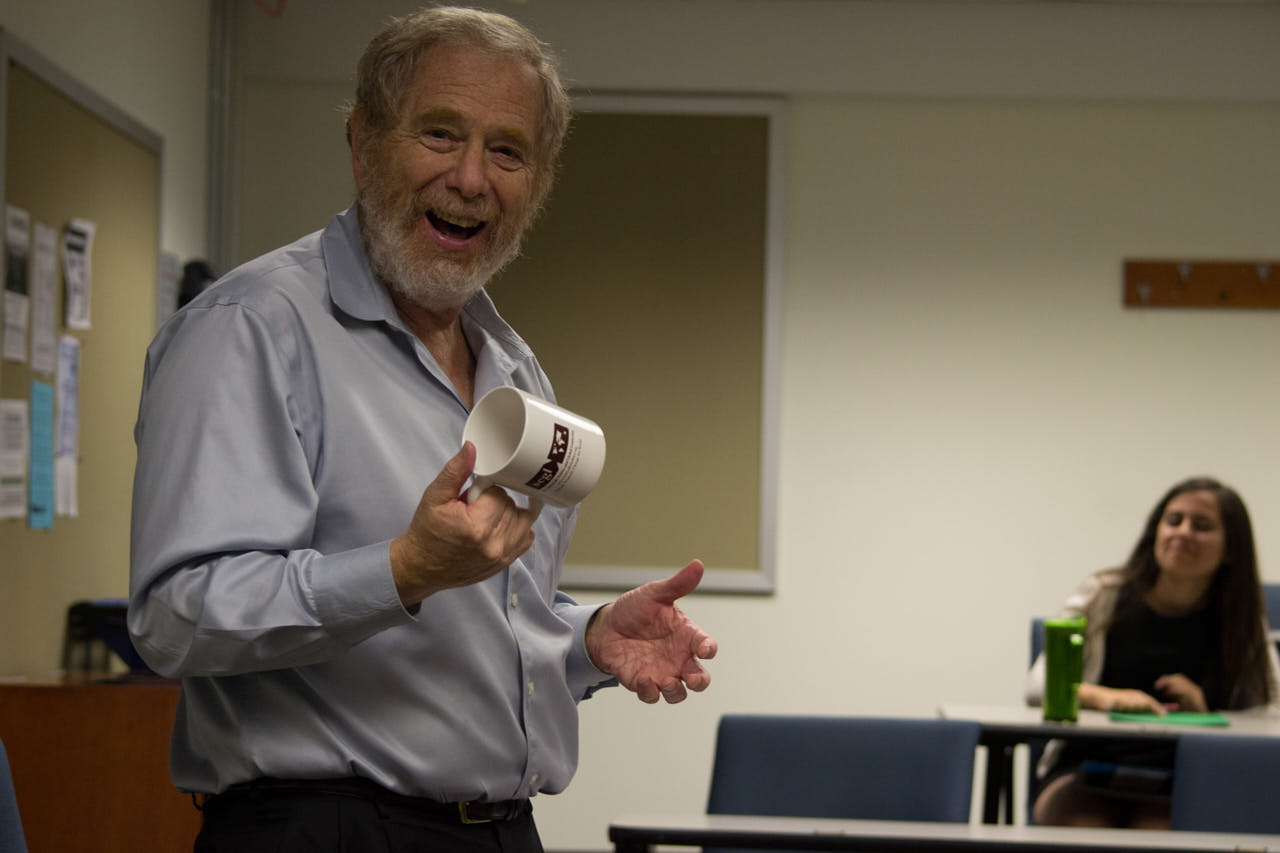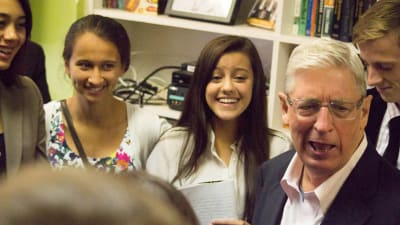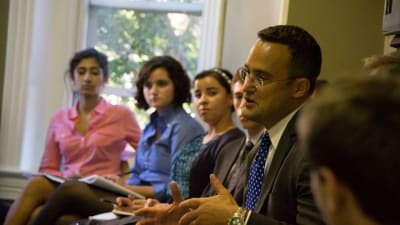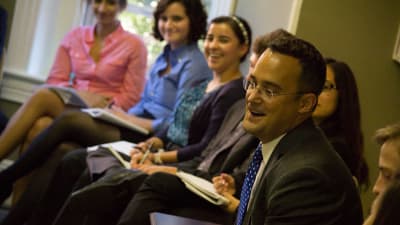“OK, KNUCKLEHEADS”: FALL 2013 TAKES AIM AT THE SECOND AMENDMENT
DC v Heller is one of the most important Supreme Court cases in recent memory. The case, which declared for the first time a Constitutional right to own a handgun, is particularly meaningful to study after last week’s tragic shooting in DC’s Navy Yard.
On Monday the students heard an overview of the key issues that the Supreme Court faced in Heller. (From the list the students received: 1) What does “Right of the People” mean? Is the right individual or collective? 2) What does “Keep and Bear Arms” mean? What kind of arms? For what purpose? 3) What is a “Well-Regulated Militia”? A state-organized entity or a group of pre-existing individuals? 4) What does “Security of a Free State” mean? The U.S. or an individual state? 5) What is the relationship between the prefatory and operative clauses? 6) What does precedent say, if anything? 7) What else is important to consider?) A heated discussion ensued that would continue throughout the week.
They also received their assignment: on Friday, in teams, they would act as law clerks advising a Supreme Court Justice on the Heller case. The Justice would be played by a leading expert (they were not told which expert so they would not tailor their opinions accordingly).

On Tuesday we enjoyed a rare treat: one leading lawyer from each side of the Heller case joined us for two engaging and intellect-bending sessions. First we met with Walter Dellinger, former Acting Solicitor General of the United States, who has argued many cases before the Supreme Court. Dellinger represented the District of Columbia in Heller. He began with a poignant, powerful story about feeling like an outsider in elementary school–an experience that helped shape his future career–and then shared what it is like to argue before the Court. With humor and intellectual rigor he answered questions for over an hour as students scribbled down notes they could use to formulate their own opinions.

That afternoon we welcomed back Clark Neily, a longtime SEGL guest expert and the attorney who conceived of and organized the plaintiffs for the Heller case. Neily said he used the same strategy Thurgood Marshall used to bring the Brown v. Board of Education case to trial. (Neily was at the attorneys table in front of the justices during the Supreme Court oral argument.) He works as a public interest lawyer for the Institute for Justice, a libertarian institution; along with convincing arguments against the DC law, he answered several questions about his libertarian-esque orientation. (He also gave a sneak preview of an upcoming lawsuit he is about to file.) One key moment in the discussion came when a student defended New York City’s controversial “stop-and-frisk” policy by saying “according to polls, most New Yorkers support it.” Neily responded that if we allowed popular majorities to decide what rights we had, our nation would be a troubling place.

On Friday, the students traveled to Georgetown Law Center to meet with their “Justice”: Professor Louis Seidman, a leading and frequently-published Constitutional law expert who once clerked for Thurgood Marshall. Professor Seidman played the role of a Justice with voracious vigor: he pulled no punches as, group by group, the students presented their opinions. At every opportunity, Seidman interrupted with penetrating and dissenting questions that kept the students on their toes. Wasn’t the Framers’ intent to allow muskets, not machine guns? How can the Second Amendment apply to DC, which isn’t a State? Can you really argue that someone can have a gun but only to use when called to participate in the militia? And, recalling what Justice Marshall often called his clerks, he started one grilling session, “OK, knuckleheads, what do you think?”
The session helped students hone their ability to think and speak on their feet, to question the premises of an adversary, and to collaborate as a team under pressure. More important, Seidman’s questions helped the students learn a new way of thinking: to approach Constitutional issues from a legal framework, not a political or emotional one. (“It’s not my job as a judge to decide what I think is best,” he said at one point. “It is my job to interpret what the Constitution says.”) It is here that the students may have learned the most.
When a student asked Seidman how he prepared for the session, he said he thought of as many good arguments on either side of the issue that he could. This is how great legal minds work, he said, and this is a particularly helpful way of thinking about challenging issues. “When I think of the dysfunction in Washington, I wish that the Members of Congress either went to law school or remembered what they learned there,” he said.
Next week we welcome this year’s Golden Mug Award winner Lissa Muscatine, among other guests. Stay tuned!















